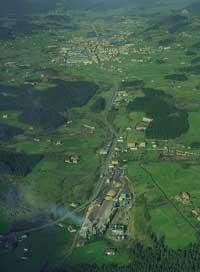The law does not meet the expectations generated in twenty years
1997/11/01 Kaltzada, Pili - Elhuyar Zientziaren Komunikazioa Iturria: Elhuyar aldizkaria
The Environmental Law, presented by the Basque Government in the summer of 1997 and to be discussed in Parliament on 24 October, does not satisfy at all the expectations generated in the last twenty years.
We did not expect, much less, a panacea to solve all ecological problems, but a tool that alleviated the painful ecological state created by the current development model. But for this it is also necessary a political will much stronger than the Law reflects.
The law contains basic errors. The lack of participation of human agents, especially environmentalists, is one of them. In 1994, when José Antonio Maturana was a counselor, we were sent the draft. Since then, and so far, we have had no official record of it.

As already mentioned in that draft, let's say that it showed a much greater will than the one now presented and that it was much more concrete. Article 2, for example, stated that environmental protection "must be not only the role of environmental policy, but the axis of all public policies". This mention has disappeared from the Law, as has disappeared the ninth article that referred to "measures to support environmental associations". Articles 27 and 28 of the draft spoke of the Basque Environmental Agency, defining the personnel and resources needed for this new body. Instead of this agency, the current law creates the Environmental Commission of the Basque Country, whose function is not as defined as yours.
This is not a minor modification, since it must be taken into account that the Environment Commission, together with the Environment Council, is one of the few novelties of the law. The objective of the Commission, composed exclusively of representatives of the Administration, is to report on projects and programs, especially on the new Environmental Framework Program. The Council, for its part, will include representatives of different popular groups – even if they do not specify which and how much – but this, as the name suggests, can only give advice and has no decision-making capacity.
The novelty, and we understand that it can be the most positive part of the Law, is that of certain plans (Territorial Planning Guidelines, Partial Territorial Plans, General Urban Planning Plans...) Mandatory Environmental Impact Assessment. This is Eguzki's repeated demand in recent years and reiterated by the Administration. Innovation is welcome, but at least in part it must be recognized late, especially taking into account the recent approval of the Spatial Planning Guidelines and other relevant documents.
As for the rest of the “novelties” that the law says and that the media have mentioned in recent weeks, we only have to say that they are not true innovation. The right to information on the environment, for example, is endorsed by a European Directive, which has been in force for a long time. As for the world of work, the Environment Law does not mention that the Occupational Risk Prevention Act does not mention it. For example, eco-audits. These eco-audits, unfortunately, remain voluntary and the participation of workers' representatives is not guaranteed.
Let us say, as a conclusion, that the Law does not meet expectations at all and, in our opinion, is far from the needs of the Basque Country from an ecological point of view. This law is weak, it lacks strength; contrary to what happens to wines, it has worsened over time, and the place that leaves us human agents is only that of vases, as if it were a discouragement.
To get there we didn't need a twenty year trip.

Gai honi buruzko eduki gehiago
Elhuyarrek garatutako teknologia






